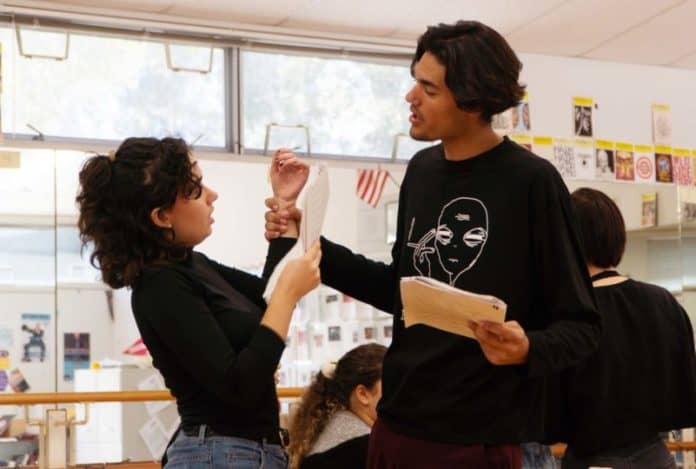By Yvette Urrea Moe, County of San Diego Communications Office
It starts with a seemingly random text message from a teenage boy to a teenage girl.
He tells her he knows some people she knows, and she agrees to text with him. She is cautious at first and balks when he immediately asks her for a picture, but when he sends her a selfie, she is giddy that he is so handsome. She sends her picture back, he turns on the charm, and she is hooked. Quickly, he establishes that they are in a relationship and it escalates from that point, until he is controlling what she wears, gives her drugs to relax her so she will take sexy photos for him, and tells her how to circumvent her parents.
This all unfolds in “Trapped,” an hour-long play written and performed by students to teach their peers about the dangers of human trafficking. In this dramatization, the teenage girl is saved before she is assaulted. Yet it is clear to everyone in the audience of middle and high schoolers what follows all too often in real life. She would have been assaulted and then “sold” to others.
This authentically performed play was created in a partnership between the School of Creative and Performing Arts in San Diego and the Human Trafficking Task Force San Diego. The task force is led by the local office of the Department of Justice and has members from nearly every local law enforcement agency, including the County’s Probation Department, Sheriff’s Department and District Attorney’s Office.
“Trapped” portrays a very real problem occurring in San Diego County and across the United States. Task Force San Diego Commander Fernando Huerta told a group of student actors that last year alone they investigated 314 potential cases of human trafficking in the San Diego area.
“We really want to thank these students and the staff for the incredible job they did with this play,” Huerta said. “The impact of what they are doing is profound because it’s really happening to kids nearly every single day.”
Probation Officer Mike Wiener and San Diego Police Detective Dan Dierdorff, both members of the Human Trafficking Task Force, even portray undercover officers and ultimately arrest the bad guys – this was met with whooping and applause from the students during a recent performance of the play.
Students in the audience also reacted with gasps or disapproval at bad choices or mistreatment of the girl. At the end of the play, the officers answered questions from the students in the audience about what to look out for and how to respond. They told students that the average age of victims nationwide is 14, but it’s 16 in San Diego.
Wiener said most students are unaware that this kind of victimization is happening in their own communities.
“Before (the Department of Justice) approached us about it, I didn’t know it was that big of an issue,” said Devon Jack, 17, who plays the top high school pimp in the play. “Talking to the two officers backstage, who I hang out with, it’s very present in high schools. They were talking about one (case) at a local high school, and yeah I wouldn’t have believed it until they told us that it’s actually a thing and it does happen to people our age, and middle schoolers.”
The “Trapped” play was shown at the School of Creative and Performing Arts in San Diego at the end of April. Huerta said the Task Force will continue the partnership with the school next year to produce the play with another class and hopefully obtain funding to take the play to more high schools or middle schools.
Roxane Carrasco, the project director for the School of Creative and Performing Arts, said after agreeing to the partnership and the topic a year ago, everyone involved in the project took a crash course in human trafficking from Wiener and Dierdorff so they could understand the problem.
The task force wanted the play to bring awareness of the problem to students from sixth to 9th grades but not be too graphic and shocking, Carrasco said. A playwright worked with students from an English class to write the script so that it sounded like teenagers and sounded real.
“The Department of Justice helped us make the play as accurate as possible, so everyone could get the correct information. Now, I can tell people signs or stuff and warn them too in case they know anyone, so they can help too,” said Alexxa Hernandez, 16, one of the student producers.
Students from the theater department worked out how they would stage it, using a white screen in between the actors that showed their texts as well as the passage of time and setting. Finally, students from the senior musical theater acting class were selected to play the parts.
Maia Larom, 17, plays the lead girl and target of the trafficker. She said she hopes her peers learn something from the play.
“He uses charm to get her to trust and that’s where she fell short, she trusted too quickly. And you just can’t, you have to keep your guard up because people on the internet—you have no idea who they actually are,” said Maia of her role.
Parker Richardson, 17, who plays her boyfriend/pimp, added, “I do think it’s an important message and everyone should know about it because it’s a terrible thing that happens all the time.”
Wiener said he was proud of the work the students did. The task force knew they had chosen the right group of students because of their enthusiasm about the project and their curiosity about the topic and how to portray it accurately.
After the two officers gained the trust of the students, a few students confided in the officers that they knew of someone who was involved, but not at their school, Wiener said.
Carrasco said she has been having the students involved in the production write self-reflections on what they’ve learned through this process. Going into it, students had preconceived stereotypes that all the girls being pimped were from a lower social demographic or from troubled homes. While some are, Carassco said they learned that many are also from affluent homes.
“That’s really not the draw, the draw is acceptance and so it affects all walks of life,” Carrasco said.
Over the summer Carrasco will be working with the Department of Justice to package the play materials so that it can be sent to any other school or organization in San Diego County or in the country for others to put on the play using the script and stage production information.
A grant from the High Intensity Drug Trafficking Area helped fund the play, which included hiring a professional playwright and a professional production company to work with students to write and film the play. The professional production team filmed the play so that it could be shown to other human trafficking task forces around the country that may want to do something similar in their community.
To learn more about human trafficking, you can visit the County’s Health and Human Services The Ugly Truth campaign or the DA’s website for prevention tips and warning signs.
If you are in immediate danger due to human trafficking, please call 9-1-1. If you are not in immediate danger but need help or suspect someone you know needs help, contact the National Human Trafficking Resource Center 24/7 tollfree hotline at (888) 373-7888, or text BeFree or 233733.
Yvette Urrea Moe is a communications specialist with the County of San Diego Communications Office. Contact


















